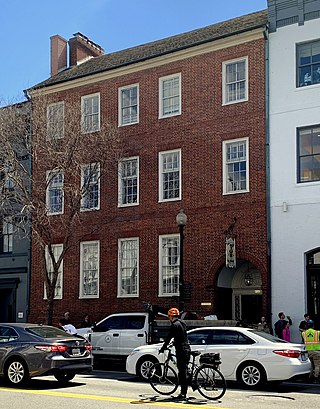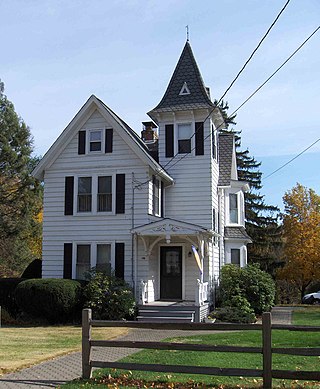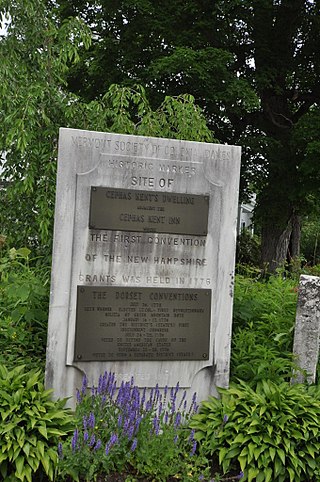
Georgetown is a historic neighborhood and commercial district of Washington, D.C., in Northwest D.C., situated along the Potomac River. Founded in 1751 in the Province of Maryland, the port of Georgetown predated the establishment of the federal district and the City of Washington by 40 years. Georgetown remained a separate municipality until 1871 when the United States Congress created a new consolidated government for the whole District of Columbia. A separate act, passed in 1895, specifically repealed Georgetown's remaining local ordinances and renamed Georgetown's streets to conform with those in the City of Washington.

Chesterfield, originally known as Recklesstown, is an unincorporated community located around the intersection of County Route 528 and County Route 677 in Chesterfield Township of Burlington County, New Jersey.

Buildings, sites, districts, and objects in Virginia listed on the National Register of Historic Places:

This is a list of structures, sites, districts, and objects on the National Register of Historic Places in North Carolina:

This is intended to be a complete list of the properties and districts on the National Register of Historic Places in Fairfield County, Connecticut, United States. The locations of National Register properties and districts for which the latitude and longitude coordinates are included below may be seen in an online map.

The City Tavern Club is a private club in the Georgetown area of Washington, D.C., United States. It is housed in the City Tavern, one of the oldest buildings and the last remaining Federal-period tavern in the city.

Oxford station was a historic train station at South Elm and West Spring Streets in Oxford, Ohio. Oxford first received railroad service in the 1850s, when a line connecting the Chicago and Cincinnati rail networks was completed through the city. The original station was replaced by a larger building in 1895. Before the rise of the automobile, the station's passenger services brought students to and from Oxford's multiple colleges, including Miami University, and its freight services shipped local agricultural products to their markets. A building known as the Junction House, located across the street from the depot, was built in 1860 and is closely associated with the railroad. Originally a grocery store, it became a hotel and tavern in 1868; while a local temperance movement closed the tavern in the 1870s, it remained a hotel until 1905 and is now an apartment building.

List of the National Register of Historic Places listings in Mercer County, New Jersey

The Old Stone House is the oldest unchanged building structure in Washington, D.C. The house is also Washington's last pre-revolutionary colonial building on its original foundation. Built in 1765, Old Stone House is located at 3051 M Street, Northwest in the Georgetown neighborhood. Sentimental local folklore preserved the Old Stone House from being demolished, unlike many colonial homes in the area that were replaced by redevelopment.

This is a list of the National Register of Historic Places listings in Scott County, Minnesota. It is intended to be a complete list of the properties and districts on the National Register of Historic Places in Scott County, Minnesota, United States. The locations of National Register properties and districts for which the latitude and longitude coordinates are included below, may be seen in an online map.

This is a list of the National Register of Historic Places listings in Goodhue County, Minnesota. It is intended to be a complete list of the properties and districts on the National Register of Historic Places in Goodhue County, Minnesota, United States. The locations of National Register properties and districts for which the latitude and longitude coordinates are included below, may be seen in an online map.

Marion is a neighborhood in the town of Southington, Connecticut. It is generally the area in the vicinity of the intersection of Route 322 and Marion Avenue just north of the Cheshire town line.

The Old Eagle Tavern is a historic building located at 431, 433 South Broad Street at the corner of Ferry Street in Trenton, Mercer County, New Jersey. The building was built in 1765 by Robert Waln. The building operated as a tavern and hotel from 1765 to 1896. It was added to the National Register of Historic Places on November 3, 1972 for its architectural, commercial, and political significance. The building is also a contributing property of the Trenton Ferry Historic District, which was listed on June 26, 2013.

Red Horse Tavern, also known as Brookside Inn and The Old Stone House, is a historic inn and tavern located near Aurora, Preston County, West Virginia. It was built between 1825 and 1827, as a dwelling. In 1841, it opened as a public inn to serve travelers on the Northwestern Turnpike. It is built of rubble stone, and has one large downstairs room and three upstairs rooms with an attic above them.

Prospect House is a historic building, located at 3508 Prospect Street, Northwest, Washington, D.C., in the Georgetown neighborhood.

Smyrna Historic District is a national historic district located at Smyrna, Kent County, Delaware. It encompasses 850 contributing buildings in the town of Smyrna. It includes the majority of residential, commercial, public and ecclesiastical buildings that pre-date 1920, the bulk of which were constructed in the mid-to-late 19th century. Notable buildings include the Cummins-Stockly House, Irishtown Tavern, Spruance House, John Cummins Mansion, A. G. Cummins, Sr. House, Governor William Temple Mansion, Daniel Cummins' Tavern and House, "Greybox," Delaware House, Jones' Drug Store, Smyrna/Clayton Masonic Building, the Peterson Building, Tilghman Building, Abraham Pierce Store, the "Colonial Hotel," Bethel African Methodist Episcopal Church, Citizen's Hose Company No. 1, Benjamin Benson House (1834), Asbury Methodist Church, Ebenezer Cloak Mansion, and Mt. Olive Holiness Pentecostal (1876).

The Smith's Corner Historic District is a historic district encompassing a historic 19th-century rural village center. Covering about 105.5 acres (42.7 ha), the district is centered on the junction of Main Avenue, South Road, and Chase Road in northwestern South Hampton, abutting its border with East Kingston. The village was important as a stagecoach stop. The district was listed on the National Register of Historic Places in 1983.

The Kent Neighborhood Historic District encompasses a little-altered early 19th-century rural neighborhood of Dorset, Vermont. Centered at the junction of Dorset West Road and Nichols Hill Road, the area is also historically significant as the site in 1775 of the first meetings that culminated in Vermont's period of independence prior to become the 14th United States state. The district was listed on the National Register of Historic Places in 1978.

The Lesinger Block, also known as Little Bohemia, is a historic building located in Cedar Rapids, Iowa, United States. This building was constructed at a time of economic expansion in the city. It is a contemporary of several Italianate commercial blocks that were built downtown. Because of subsequent development in that commercial district those buildings have been replaced with newer structures leaving this building as the best extant example of commercial Italianate in Cedar Rapids. It was constructed by Vaclav Lesinger, an immigrant from Kozlov, Bohemia. He was a tailor by trade and he had this structure built in 1883 to house his tailor shop and a dry goods store. Since 1907 the building has housed a tavern that has served as a social center for the local Bohemian community. Architecturally, the two-story brick structure still retains a good deal of its original wood ornamentation, including the sawtooth frieze above the storefronts and the geometric design in the bracketed cornice.

The Boston Land and Manufacturing Company Store, also known as the Jim Brown Tavern, is a historic building at 1556 Boston Mills Road in Boston, Ohio. The store was built in 1835 for the Boston Land and Manufacturing Company, which used it as a general store and post office until 1904. The building's design includes elements of the Federal and Greek Revival styles. It features a gable front with a fanlight, a wraparound front porch, and Ionic pilasters. In 1905, the store was converted to a private house. It is currently a park store for Cuyahoga Valley National Park and a trailhead on the Ohio and Erie Canal Towpath Trail.





















